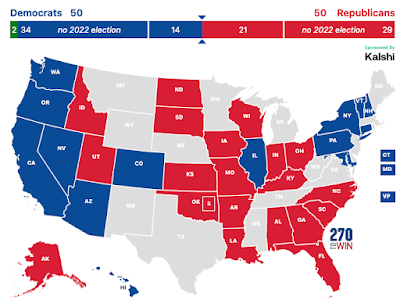2022 Midterm Projection: Fundamentally Republican
I think this is going to be an ugly election cycle for the Democrats. We can expect losses for the president's party in Congress in their first midterm election, and Joe Biden has not done anything to change my expectation. This is compounded by the fact that the economy seems to be the most pressing concern for voters, and inflation is a very difficult issue for policymakers to make go away or minimize. Since inflation is effectively making money less valuable, people that have a lot of money hate it, and even though unemployment is at a record low right, and many people in lower tax brackets have money in their pockets, it doesn't seem to go as far when you have to pay large bills for gas, heating your home or buying groceries.
So I believe we'll see the US House of Representatives swing to Republicans, probably with about 15-20 Democratic seat losses. Oddly, this is not actually that high of a number (Trump's party lost 41 in his only midterm, Obama lost 63 in his first midterm, George W. Bush's first midterm was right after 9/11 and they gained seats, but he lost 31 in his second midterm). So I think that if it's a wave, it'll be a small one for two reasons.
First, there's not much low-hanging fruit to be picked. Democrats held all sorts of seats they probably had no reason holding after the 2008 wave election, and the 2010 midterm washed those out. But because the Biden/Trump election was so close, it's not like there's tons of red-state Democrats with targets on their backs. The tightest house elections look like they'll be in Pennsylvania, New Hampshire, or Florida.
Second, the Dobbs v. Jackson decision has upended the usual policy flow. One reason voters usually rebuke the president's party is that policy usually swings in their direction in their first term, but unless you're a big roads-and-bridges guy, the biggest policy movement in the past year has been SCOTUS allowing abortion to be banned for about a third of the population. So even though Democrats have control of the popular institutions, policy has moved in a markedly conservative direction. Now I don't think this will "save" Democrats in this election (and recent messaging being about traditional Democratic issues of Medicare and Social Security seems to indicate that the campaigns feel the same way), but it has upset the expected dynamics.
But the fundamentals are bad for Democrats: Incumbent president. Bad perception of the economy. Donald Trump currently out of sight for the moment.
Due to a wonky bit of GOP nominee selection (particularly picking bad candidates in Don Bolduc, Mehmet Oz, and Herschel Walker), there could be hopeful news for Democrats is that despite the negative context, I think they could *just barely* hold on to the US Senate. This would require some magic from John Fetterman in Pennsylvania and Mark Kelly in Arizona, but after staring at it, I think they can pull it off. It also looks to me like Georgia will head to a run-off for Warnock/Walker, and I would think the lower turnout would help Walker in a run-off. But I got that state decidedly wrong twice in 2020, so it's hard to know.
I'd also anticipate bad things for Democrats in the state-wide Governor elections: Kemp in Georgia, Michels in Wisconsin, Lombardo in Nevada, Sununu in New Hampshire, Lake in Arizona. Even the fact that Oregon and New York are contested at all, yikes.
If you're looking for good Gubernatorial news for Democrats, we can look to Pennsylvania where Josh Shapiro is primed to defeat Doug Mastriano, who made his name on trying to delegitimize Pennsylvania's presidential vote in 2020. It appears as if the GOP over-reached in that election. With a Republican-held state legislature, this election could have more impact on the 2024 election than any other (with the exception of Wisconsin that looks like it is going red).
Finally, a word on polling. Pollsters are calling this one of the hardest elections they've ever had to project. Largely, this is due to a huge drop in the quality of telephone-based polling. As someone not involved in the polling business, I feel free to cast aspersions on polling, which I think is fundamentally broken. I've still not recovered from the 2020 that had a seemingly consistent 5-6% point bias in favor of Democrats. However, that bias seems to materialize the most when Trump is on the ballot, which he is not this time around, and the 2018 error wasn't so bad. Pollsters seem to be reaching a consensus on how to run polls that involves aggressive weighting of the responses, as drawing a representative sample from random methods seems increasingly unlikely. However, this relies on them making assumptions about turnout and other factors that are akin to just guessing the outcome! So I think it's a pretty grim time for the industry.
Another take is that this election is just going to be bad for Democrats, and the pollsters that are mostly aligned with major media outlets want to project not doom to those audiences. We will see.


